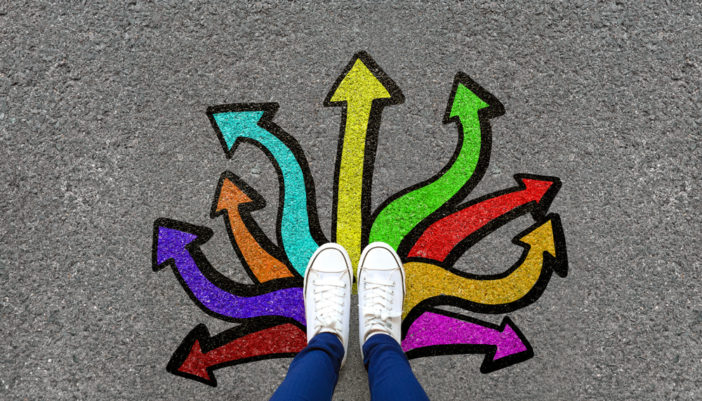Why It’ So Hard to Choose
If you struggle with indecision then you know the panicky feeling…when you’re sitting with a large restaurant menu at a new restaurant and cannot make a choice, for fear of selecting the “wrong” thing. What if you don’t like it? What would others think if they knew you secretly struggled with decisions? And what about those other decisions in your life that you eternally put off for very good reasons?
You’re certainly not alone. Indecision panic is very common with those of us who struggle with social anxiety and self-confidence, which I think are pretty much the same thing. We don’t trust ourselves to just go with our gut, trust our own preferences and knowledge, and take the plunge. Why? Because that got messed up for us a long time ago, and/or we are still in environments that don’t encourage or at least allow us to be authentic.
The causes are all fear-based. You probably learned early on not to trust what you think, feel and need as I have talked about before. This could have happened in very obvious ways via verbal or physical abuse, or subtle ways with questioning your desires, your needs and your decisions. You then had no recourse but to internalize these questions and doubt yourself. This created a lack of self-trust – that half of you believed. I say that because I think if ALL of you believed it you wouldn’t struggle with anxiety or depression issues. Or physical ailments that are all stress-induced.
This brings on forms of perfectionism, where whether you admit it or not, you need things to be perfect, because with the black-and-white thinking it must be horrible if not. Then you aren’t good enough. Sounds crazy when you say it aloud, but this is the distorted belief. Or part of it. The other part is the fear you won’t know what do with “good enough” or the gray area. Not yet at least. Living in absolutes gives us the illusion of protection from shame. And from the fear of not being enough as is.
The first way to work through this is to do so in a therapeutic space with strong support and loving accountability. You need to grieve what happened, and how it still impacts you. There is deep work to do here on loving yourself unconditionally and choosing a different way of being after you tally all the costs of not risking being yourself. All the opportunities not taken, or the love allowed in.
On top of that, we need to change pathways in the brain, and thus automated thoughts and behaviors. One way to do this is to positively reframe it. At the restaurant you could quietly say to yourself: “Well if I don’t like it I won’t order it again.” Or “It will be good to try something new – a mini adventure.” You can take circumstances and bring a different angle. The silver lining, the “It’s ok I’ll redo it, fix it or tweak it later if I need to.” I really like these since they get you out of the panic, because you’ve already said to your brain: “It’s ok. No reason to fight or flee or fail.”
Then, as you practice learning and tweaking things, you give your brain the experiential data it can’t argue with: You figured it out and actually it turned out pretty well. Or you learned something and feel good about that. This all increases your self-confidence, as you start trusting yourself, and taking responsibility for the choices instead of running from them.
So if you want to begin looking forward to those wonderful menu choices, get a coach, get the therapy and start healing. The rest takes care of itself.




